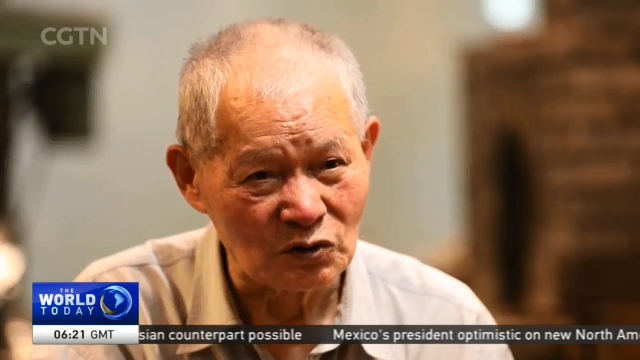
14:46, 28-Jul-2018
Sharing China's Market: How to sell a knife in China? Tell customers stories!
Updated
14:33, 31-Jul-2018
03:33

China has become the largest market for nearly all products worldwide. This is thanks to its huge population and rising purchasing power. Domestic and Western brands are competing for customers with marketing strategies tailored to local mentalities. CGTN's Han Peng takes a look at how the competition is unfolding, by looking at the sales of some of the most common articles of daily use: kitchenware.
Hammer the iron when it's glowing hot, Shi Jinshui, now in his 80s, and his two apprentices in their 50s, are among the very few in China who still master the art of making knives and scissors by hand.
SHI JINSHUI, NATIONAL INHERITOR CHINA'S INTANGIBLE CULTURAL HERITAGE "To make a pair of scissors, the first step is to insert steel in what will be their blades. That's before we heat them to 12-hundred degrees Celsius. This technique was first invented in China by our brand."
And he's not bragging. It's a four-hundred-year-old brand, Zhang Xiaoquan, named after a man who made a living by forging kitchenware late in the Ming Dynasty.
"High values, low prices" has always been the image of this humble, traditional Chinese brand. But today, it's facing a daunting challenge from the West.
This is the newly opened flagship store of German kitchenware brand, Zwilling. It's the brand's largest store in the world, located in downtown Shanghai. Besides selling knives and forks, the store runs an Italian restaurant, and has hired Michelin-starred chefs.
CORNELIA POLETTO, CHEF ZWILLING FLAGSHIP STORE, SHANGHAI "If you want to have a good beef tata, you have to have the best ingredient. This beef is from Australia. And most importantly, a sharp knife. And you cut it not too fine, so you can keep the taste and texture of the beef."
Cooking is just part of her job. The store wants these chefs to promote their kitchenware. China has now surpassed Germany and the United States to become Zwilling's biggest market.
DR. ERICH SCHIFFERS CEO OF ZWILLING "The core value of our product is quality. But quality alone is not really enough to compete with the others which also claim that they might have a good quality. The content of the product is also very important. That means we need to tell the stories."
Zwilling's CEO says they hope the rising Chinese middle class will buy the story that their products represent fancy lifestyles.
HAN PENG SHANGHAI "Chinese kitchen used to be a place of choking smoke and greasy stoves, but not anymore. Now for many families, it's more than a place of just doing household chores and putting the food on the table. It's a place to enjoy leisure time and, probably, cook some meals with delicacy.
But, a centuries-old Chinese brand that went through the rise and fall of imperial dynasties, wars, famine and industrialization has quite a story to tell as well.
Today, the back-breaking labor of fashioning knives and scissors is widely outdone by booming assembly lines. And this small workshop is part of a display in a downtown museum in Hangzhou.
Be it a domestic or a Western brand, market folks will tell you that a story is much easier to sell than product. Han Peng, CGTN, from Shanghai and Hangzhou.

SITEMAP
Copyright © 2018 CGTN. Beijing ICP prepared NO.16065310-3
Copyright © 2018 CGTN. Beijing ICP prepared NO.16065310-3